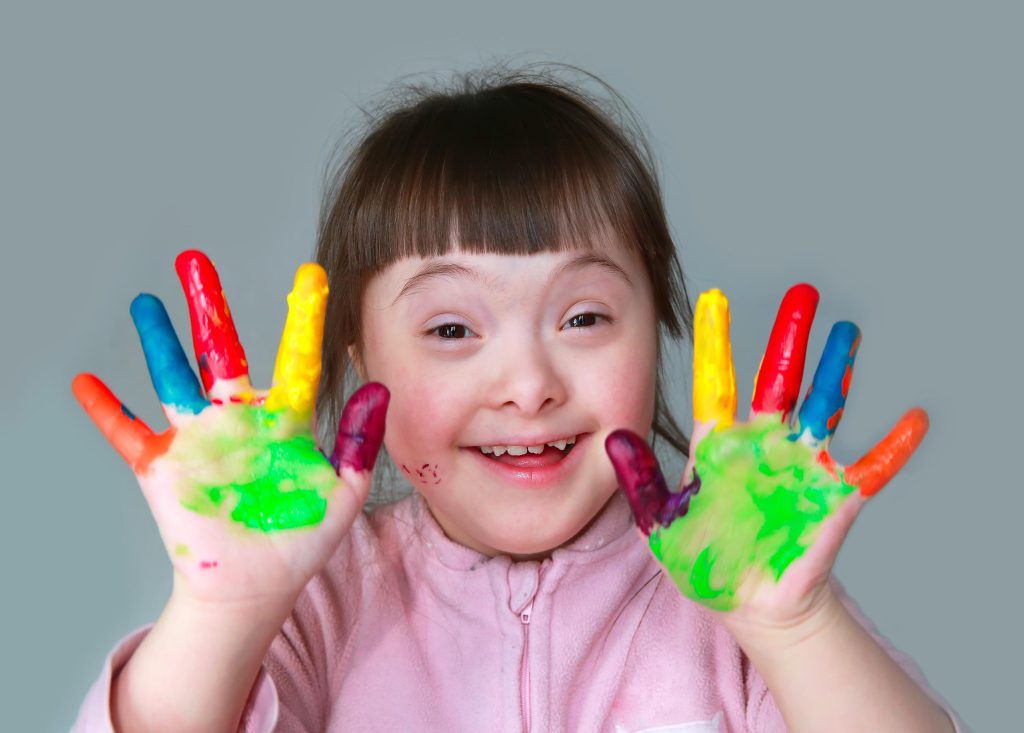Down syndrome is a genetic condition caused by the presence of an extra copy of chromosome 21. This additional genetic material affects the development of a person’s physical and intellectual abilities, leading to characteristic features.
Some characteristic features of Down Syndrome are:
- Flattened face, especially the bridge of the nose.
- Almond-shaped eyes that slant up.
- Short neck.
- Small ears.
- A tongue that tends to stick out of the mouth.
- Tiny white spots on the iris (colored part) of the eye.
- Small hands and feet.
People with Down syndrome may also have some health issues such as heart defects, hearing loss, and vision problems.
It affects roughly 1 in every 830 live births and is one of the most common inherited birth diseases. In India, about 1.3 lakh babies are born with this condition each year.
Down syndrome is also associated with intellectual disability. While the severity of the disability varies, the majority of Down syndrome patients have mild to moderate cognitive impairment. However, with the appropriate assistance and training, people with Down syndrome can still lead happy lives.
While there is no cure for Down syndrome, early intervention and education can greatly improve the condition’s outcomes. Early intervention services like physical therapy, occupational therapy, and speech therapy are frequently provided to children with Down syndrome. These services can aid in the development of skills like walking, talking, and self-feeding.
Another important component of supporting people with Down syndrome is education. Numerous kids with the condition attend inclusive schools where they study side by side with their peers who are typically developing. According to research, inclusive education can help all students, including those with Down syndrome, by fostering academic and social development.
Down’s syndrome affects learning in some ways in children and young adults. They might therefore require assistance with daily tasks. Each person has a different need for assistance. And as they age, this may alter.
To aid in their development, you can try the following:
- In order for them to learn from you, speak clearly and calmly.
- Play games with them, sing songs, and read books with them to help them learn sounds and words.
- Look out for changes in mood or behavior, and try showing them how to do something rather than just giving them instructions.
- Take them for routine checkups because they might not be able to let you know if something is wrong or they’re sick.
Despite the difficulties brought on by having Down syndrome, many affected people enjoy fulfilling lives. People with Down syndrome are capable of expanding their skill sets, engaging in hobbies and interests, and giving back to their communities. There has been a growing movement in recent years to encourage diversity and inclusion of people with Down syndrome and other disabilities, breaking down stereotypes.
However, discrimination and significant barriers still exist for people with Down syndrome. Some societies view people with Down syndrome as tragic or burdensome, which breeds prejudice and unfavorable attitudes. Additionally, because of their disability, people with Down syndrome are frequently denied access to healthcare and other services.
Down syndrome is a complex condition that affects people differently. However, people with Down syndrome are capable of leading happy, fulfilling lives and making significant contributions to their families and communities with the right support and resources. We can build a more just and equitable world for everyone, regardless of ability, by fostering inclusion and acceptance.
